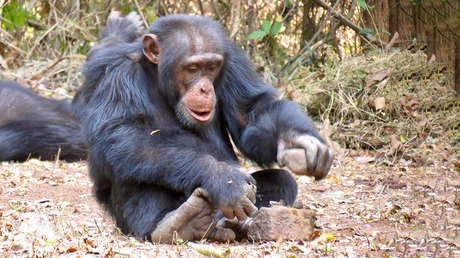 Chimpanzee culture is more human-like than previously believed, as chimpanzees also need to learn complex cultural behaviors from others, according to a new study led by researchers at the University of Zurich, Switzerland.
Chimpanzee culture is more human-like than previously believed, as chimpanzees also need to learn complex cultural behaviors from others, according to a new study led by researchers at the University of Zurich, Switzerland.
Humans have a complex culture that allows them to copy the behavior of others, that is, a cumulative culture: skills and technologies accumulate over generations and become increasingly efficient or complex.
According to anthropological hypotheses, chimpanzees do not learn in this way, but rather can reinvent cultural behaviors individually.
However, the authors of the new study note that this may not be the case, and to prove this they conducted a series of field experiments on Mount Nimba in Guinea.
The objective of these was to see if wild chimpanzees can independently invent a complex behavior, such as cracking nuts, and to do this they were presented with a series of four tests.
First, palm nuts and stones were placed in an area frequented by primates. Next, a palm fruit was added to the experimental setup.
In the third experiment, the scientists broke the nuts and left them on top of some stones. And finally, they placed another variety of nut that was easier to crack along with stones.
The chimpanzees explored the nuts and stones, but did not crack any nuts, even after more than a year of exposure to the materials. A total of 35 groups of chimpanzees (or subgroups) visited the area of the experiments, of which eleven groups closely observed the elements.
Primates were more prone to scouting when they arrived in large groups. Only one female chimpanzee was recorded eating the palm fruit left behind by the scientists, but on no occasion did the animals break or eat the nuts.
"Our findings suggest that chimpanzees acquire more human-like cultural behaviors and are not limited to inventing complex tool-using behaviour, such as cracking nuts on their own," said Professor Kathelijne Koops of the University of Zurich and lead author. lead of the study, published this week in the journal Nature Human Behaviour.
According to Koops, the presence of a model to learn from seems to be the missing piece. These results from this study on wild chimpanzees, "our closest living relatives, help shed light on what is (and isn't) what makes human culture unique.
In particular, they suggest a greater continuity between chimpanzee and human cultural evolution than is normally assumed, and that the human capacity for cumulative culture may have a shared evolutionary origin with chimpanzees." (Text and photo: RT)